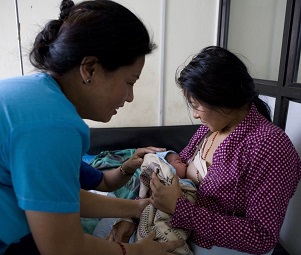WHO accelerates work on nutrition targets
COVID-19 and climate change have exacerbated malnutrition in all its forms and threatened the sustainability and resilience of food systems around the world. At the Nutrition for Growth Summit in Tokyo on 7 – 8 December 2021, the World Health Organization has announced six new commitments to accelerate progress on the 2025 nutrition targets which have been pushed even further off course during the pandemic. These include:

Expand initiatives to prevent and manage overweight and obesity;
Step up activities to create food environments that promote safe and healthy diets;
Support countries in addressing acute malnutrition;
Accelerate actions on anaemia reduction;
Scale up quality breastfeeding promotion and support; and
Strengthen nutrition data systems, data use and capacity.
Today, one third of all people around the world are affected by at least one form of malnutrition. Over 40% of all men and women (2.2 billion people) are now overweight or obese. While unhealthy diets are linked to at least 8 million deaths per year.
“Malnutrition in all its forms is one of the world’s leading causes of death and illness,” said Dr Tedros Adhanom Ghebreyesus, WHO Director-General. “WHO is committed to supporting all countries to progressively expand access to essential nutrition services as part of their journey towards universal health coverage, and to strengthening sustainable food systems to support healthy diets for all people, everywhere."
Despite incremental improvements across all forms of malnutrition over the past decade, this progress has digressed with growing rates of inequity, climate crisis, conflict, and global health insecurities.
The multiple burden of malnutrition, like stunting, wasting, micronutrient deficiencies, obesity and diet related noncommunicable diseases, are increasingly co-existing within the same community, household, and even within the same individual. With current trends projecting that one in two people will be malnourished by 2025, and an estimated 40 million children will suffer from obesity or overweight in the next decade.
In marginalized communities, child malnutrition and food insecurity are on the rise. Last year, 149 million children had stunted growth due to poor diets, lack of access to clean water and health services, and other accessibility issues. Among forty-five percent of children under 5 years of age that die, undernutrition was the underlying cause of death.
While there are positive signs of progress, such as the world being on track to hit the global target to increase exclusive breastfeeding by 2025, the COVID-19 pandemic fueled the nutrition crisis. This has particularly affected women and children, and brought unprecedented challenges and diversion of resources away from the global systems for nutrition, including health, food, social protection and humanitarian assistance infrastructure.
“Today, less than 1% of global development assistance focuses on nutrition,” said Dr Francesco Branca, Director of WHO’s Department of Nutrition and Food safety. “There needs to be accelerated action to end unhealthy diets and malnutrition, and WHO’s new commitments to the Nutrition for Growth Summit reflects this. The Nutrition for Growth Summit is a tremendous opportunity to accelerate action during the 2016-2025 Decade of Action on Nutrition.”
WHO continues to work within the three important Nutrition for Growth focus areas (health, food and resilience) by strengthening the normative guidance and supporting countries in their use; by monitoring and ensuring access to nutrition data; by providing support to governments and decision makers to integrate nutrition and food systems interventions into national universal health coverage plans, multisectoral systems and fiscal policies; and by ongoing work in emergencies settings.
